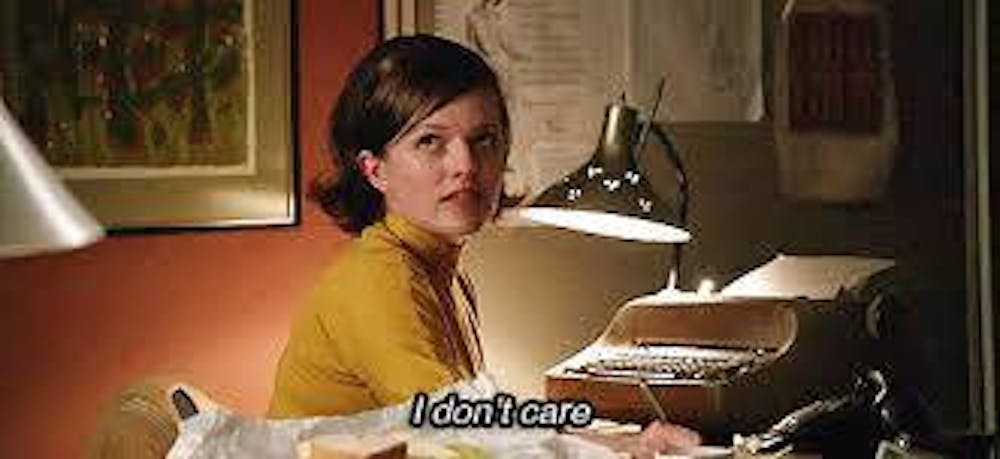My freshmen year of college, I discovered the joy of streaming Netflix on my laptop. My first semester, I spent my time watching witty 30-minute comedies such as 30 Rock, Undeclared, Arrested Development, and Parks and Recreation. By the time second semester hit, I knew I wanted a show that I could invest myself in. My family and friends had raved about Matthew Weiner's Mad Men. So, with my love of the 1960’s, advertising, and history I dove into what would soon become my favorite TV show and the one that would teach me more than any classroom would about my future career as a woman wanting to work in sports.
The series starts in the offices of Sterling Cooper in 1960. Historically speaking, birth control was invented one year earlier, Cold War tensions were running high, and workplace sexism was still the norm. In this episode, we get introduced to the show’s protagonist and hero/anti-hero (however he’s feeling at the time, really) Donald Draper, and the show’s secret protagonist, his bright-eyed secretary, Peggy Olson. Throughout the first season we see Peggy struggle as an intelligent, moral young woman trying to fit in at the Sodom like offices of Sterling Cooper. By the time the first season ends, we see Peggy enter into the man’s world of advertising as a junior copywriter, working under Don; except instead of getting his coffee, she is creating the tags to help sell Bell Jolie Lipstick.
As the series progresses, Peggy’s responsibility at whatever agency she is at increase until she is the copy editor at the newest incarnation of the show’s central agency, Sterling Cooper and Partners at the end of 1969 (aka the first half of Season 7). More than her career moving up in the ad world, we see Peggy start to assert her dominance as an equal in this man’s world that is the advertising agency. Her beautiful Burger Chef pitch at the end of this season exemplifies all she has worked for and shows that Peggy Olson has officially arrived.
Though Peggy’s story at the end of the first half of Season 7 ends semi-happily (Sorry, you’re lonely), it doesn’t mean that she didn’t struggle to get to this point. Throughout every season of the show, Peggy constantly battled being asexualized and then sexualized by her colleagues (looking at you, Stan), sexism that led to doubt about her abilities to perform (Pete every time they were paired on an account together, i.e. Clearasil), and her own beliefs about what she should have accomplished by 30 years old (you don’t need to be married to be considered successful, Peggy!). For Peggy to have achieved what she had in her career, she also needed to prove herself as a woman who could hold her own amongst a group of sexist men, or as some people would call this, “being one of the guys.” Whether it was smoking weed, getting tough on a client in a meeting, or bossing around her employees, Peggy has never been afraid to take on the stereotypically “male” persona to get ahead in her career.
As Mad Men and my college career both come to a close this spring, I’m left reflecting on a show that has pushed me to tears so many times. What I’ve come to realize after all the countless re-watching’s and episode discussions with friends is that I’m Peggy Olson (though my colleagues liken me to Ken Cosgrove because of my charm). When I first entered the WIUX station house 4 years ago, I was the “new girl,” I was a shy, innocent, and naïve freshmen from New York. I then had to prove myself as a woman that could hold her own on the Board of Directors and then as General Manager. But more than having to prove myself at the station, I’ve had to prove myself academically in the classroom.
My dream, ever since I was 10, has been to work in sports in some capacity. The 2010’s sports industry is much like 1960’s advertising industry; male dominated and slightly sexist. I have been given advice by professor’s who tell me I’ll be fine because I “act like a man” and am “opinionated and not afraid to share it.” The latter is something I have always prided myself on, but I know the people giving me these compliments also group it together with former. I’m not acting like a man when I express myself; I’m acting like a woman. Women have opinions too. Like Peggy, I’ve been asexualized based upon my ability to out perform my male colleagues in class and have been marginalized because of it. Like Peggy, I’ve been called bossy because I set high standards for me and for people that work with me. Like Peggy, I’ve learned that even if you work your butt off, sometimes you will be shafted because of your gender.
Though I’m aware of the future that is ahead, I’m less fearful of it because of seeing Peggy break gender barriers in a less accepting time in American history. If Peggy has taught me anything it’s that being assertive, hard working, passionate, and being able to create an amazing story behind an ad or a campaign (thanks to you too for that one, Don) are the tools that will take me far in whatever career I go into. As for right now, I’m excited to watch (on Sunday at 10pm on AMC) how Peggy’s journey ends in a man’s world that she has shattered.





